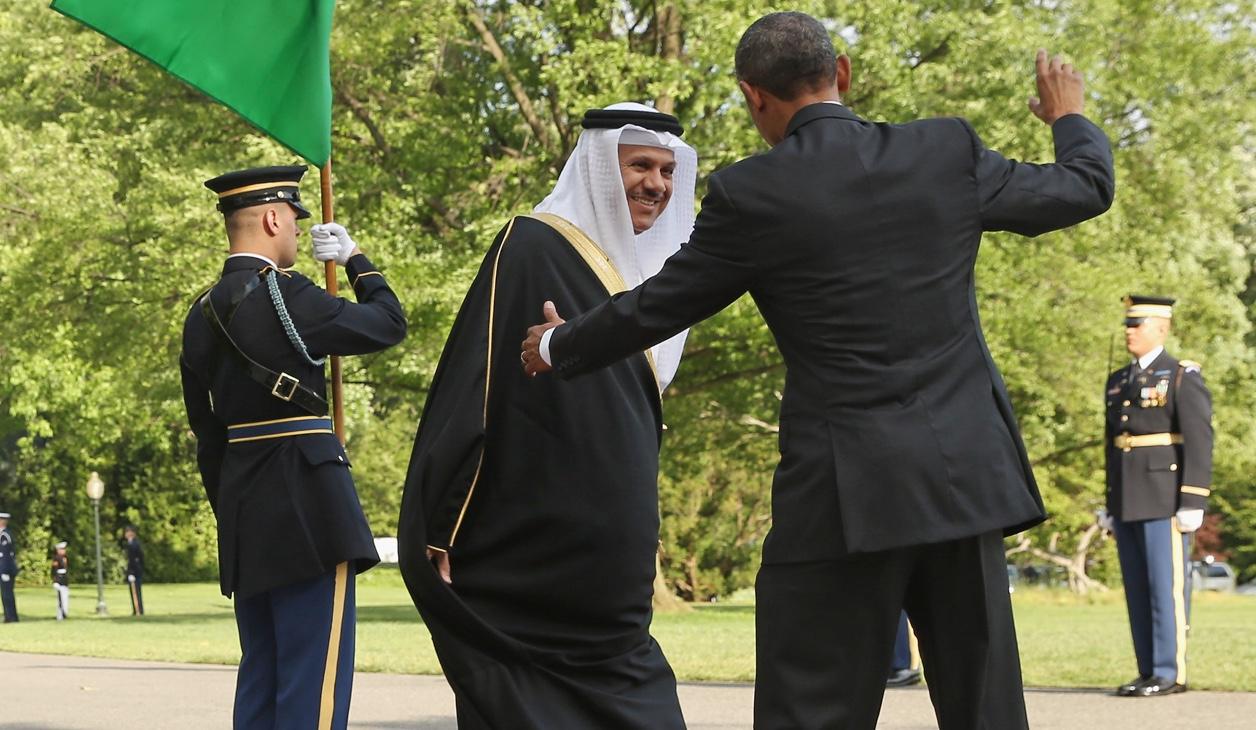The meeting at Camp David today is going to be really awkward
US President Barack Obama (R) welcomes Abdul Latif bin Rashid Al Zayani, Secretary General of the Gulf Cooperation Council, to the White House May 13, 2015 in Washington, DC.
Editor's note: This is Chatter, our morning rundown of what you need and want to know around the world. Fortunately for us all, you can have Chatter emailed to you every day. Just sign up here!
NEED TO KNOW:
Saudi Arabia and Iran don't like each other. This is well established. Saudi Arabia is the largest Sunni power in the region. Iran is the largest Shia power in the region. And pretty much every other conflict around them is in some way at least partly wrapped up in all that.
Now US President Barack Obama has set a course to strike a deal with Iran that would prevent it from pursuing nuclear weapons, at least any time soon. The goal is to both help hasten the end of the long-running conflict between Iran and the United States, and — obviously — to prevent the spread of nuclear weapons. Iran doesn't have nuclear weapons. Experts don't think Iran is even working toward building a nuclear weapon. But they have a lot of the technology needed to do so, and that worries some governments.
Obama's noble efforts, however, could potentially backfire. Saudi Arabia, who really doesn't like the sound of a detente between the United States, its great ally, and Iran, its great nemesis, is now making disturbing grumbles. Saudi officials say that whatever deal is given to Iran, they will want the same thing. “Whatever the Iranians have, we will have, too,” a former Saudi intelligence chief said at a recent conference in South Korea, according to the New York Times.
Those smaller Sunni Arab countries that seem to follow Saudi Arabia wherever it goes, have made similar overtures. If a deal is signed with Iran, these countries will begin pursuing nuclear technology at the same level. This would just ratchet up the whole nuclear proliferation threat.
Despite Obama's best efforts, it all probably made for an awkward evening at the White House last night. The American president hosted a dinner with various Arab leaders before they all go to Camp David to chat today. The meeting is filled with tension not only because of the Iran deal but also because of the unfolding events in Yemen, and a host of other issues. King Salmon, Saudi Arabia's new leader, for instance, has canceled. He will send someone else in his place. Even more insulting, Bahrain's king is skipping out on the whole thing to go watch a horse race in the United Kingdom with Queen Elizabeth.
Ouch.
WANT TO KNOW:
Yemen will no doubt come up during the Camp David meeting.
Saudi Arabia and its entourage of smaller Arab countries have been indiscriminately bombing Yemen for the better part of two months. Fortunately, a five-day ceasefire was called on Tuesday. Unfortunately, no one expects it to last. Saudi Arabia's stated military goal is to push back the Houthi rebels and reinstall the more friendly President Abd Rabbuh Mansur Hadi.
Saudi Arabia thinks Iran is behind the Houthis. And the last thing Saudi Arabia is going to allow is an Iranian proxy governing its tumoltuous neighbor to the south. Most experts doubt that Iran is really calling the shots on the Houthi advance though. The Houthis have long sought to claim power in Yemen, and have long been suspicious of foreign meddling, whether that is Saudi Arabia, the United States, or even Iran.
Whatever the case may be, the airstrikes aren't working. The Houthis have not been defeated. They haven't even really lost ground. Instead, hundreds of civilians are being killed, thousands more injured, and hundreds of thousands displaced. One of the poorest countries on Earth is only getting poorer. And hungrier.
The attacks are also fundamentally changing the face of Yemeni society, writes GlobalPost Senior Correspondent Laura Dean. Yemen's existing divisions, she writes, have been aggravated by the strikes. So whether or not Saudi Arabia decides to stop bombing, conflict in Yemen is unlikely to subside any time soon.
STRANGE BUT TRUE:
A Mexican lawmaker has head-butted a city worker in public. And it was caught on video for the world to see. What's worse, after the violent attack, the lawmaker boasts that nobody can punish him for it. So is the state of impunity in Mexico.
Mexican legislators are legally immune from prosecution, writes Senior Correspondent Ioan Grillo, who is based in Mexico City. The protections date back to the Mexican Revolution and was designed to shield legislators from political persecution. Now it just protects crooked politicians (and head-butting ones) from justice.
Every day, reporters and producers at The World are hard at work bringing you human-centered news from across the globe. But we can’t do it without you. We need your support to ensure we can continue this work for another year.
Make a gift today, and you’ll help us unlock a matching gift of $67,000!
